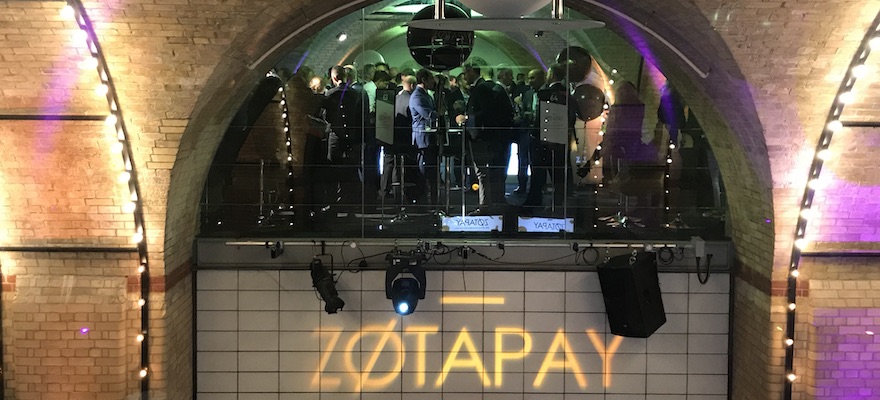If someone would have told me three months ago that I would be seeing happy faces at the Finance Magnates London Summit 2018 in November, I would be at least a tiny bit skeptical. Therefore I was very surprised to see how many industry participants came to the show in high spirits.
The vibe in the rooms was actually overwhelmingly positive, perhaps only except for the crypto floor which was visibly worried about the dramatic crypto-markets carnage that started on summit day.
So pleased to not only see the symbol of The Society of Technical Analysts (@STA_ORG) up as a media partner at the great #londonsummit18 yesterday but to work with our good friends at @financemagnates. Thank you...it was a wonderful event. pic.twitter.com/krbngZpkCc
— Eddie Tofpik (@EddieTofpik) November 15, 2018
Contrary to what some might believe, the industry executives to whom I spoke were happy that consolidation is coming. Somehow everyone who realizes that the market is changing believes that they will survive the long-awaited consolidation that is now happening.
Brokers which have been heavily focused on tech, are seeing the fruits of their labor. Others that have been more focused on marketing are feeling the pain. The division between the two camps yields a net positive picture.
Changes to the Business Model
Looking at the retail brokerage crowd, everyone seems to be realizing that changes are due to happen. Different companies are taking a different approach. Diversification of business operations geographically, regulatory arbitrage, and finally.. after some years of pause, new technology.
Half way through #Londonsummit18. Don't miss the chance to meet us in booth 55 & get to know our solutions. A lot of great presentations this year, congrats #AvnerZiv @ZotaPay pic.twitter.com/Hw2fg2DG02
— Match-Trade (@MatchingEngine) November 14, 2018
Regulatory changes across the EU have prompted a shift from aggressive marketing to a different approach to attract new clients. Some companies have been vocal about the need for the industry to shift into other asset classes.
The reduction of leverage on CFDs and the mandatory loss percentage disclosure are shifting the market in a different direction.
Some market players were expecting spreads to increase, that didn’t quite happen so far. Others are warning about offshore risks. Naturally, those are present and the ESMA’s move to price out brokers from the EU market is having some unintended consequences.
A universal opinion that I got from industry insiders at the London Summit 2018 was that they warned the regulator about the flight offshore. Feedback submitted to the regulators on the matter has been largely ignored.
Diversification Through Technology
The most exciting trend that I saw at the event, however, was the drive-by brokers and technology providers alike away from a traditional offering. The days of a Trading Platform license and investment in marketing spend appear to be over. Brokers that rely on a minimalist product that has been a very popular business model for decades are squeezed by competitors.
Interesting seminars at the #londonsummit18, a great turn out & the worlds first ever @PepperstoneFX coffee ? pic.twitter.com/wlOqjD4bZp
— Oliver Worthington (@olliesblog) November 14, 2018
The new state of the market dictates that companies need to start investing in making their offerings stand out. Both technology providers and brokers alike have been present at the Finance Magnates London Summit 2018, showing that innovation in the industry shouldn’t be forgotten.
The variety of new tools that traders have access to nowadays are opening the doors to a brand new approach to the market. Traditional competition for spreads and commissions is making way for additional market monitoring tools.
Brokers have been actively looking for those over the past several months and apparently, technology providers are here to deliver. I won’t be naming company names in order to avoid taking sides, but if you are running a retail brokerage nowadays, you have a slew of options to choose from.
From sentiment analysis to automation of market orders to advanced newswire offerings, if you’re a retail broker, you have the ability to look into at least a dozen of new ways that are designed to provide more information to your clients.
Granted, whether that new information will make retail traders more profitable remains an open question. That said, the effort that brokers are putting into the diversification of their offerings is noticeable. Having started in this market on the trader side of the market, this makes me excited about the future.
Some 15 years ago, we didn’t have access to all of the information that we have today. The dynamic approach of the industry to solve new challenges through innovation makes me think that another couple of years down the road, traders will be getting even more exciting new features.
Crypto Subdued
One excitement that was all over the place last year was missing this year. The cryptocurrency revolution remained in the fourth quarter of 2017. It’s as if time started ticking backward for this part of the industry.
The lack of Volatility on the crypto markets has translated into a standstill. Just as everyone was expecting a slow grind higher and a reversal to the massive drop since last December, the next leg lower came in.
The crypto sentiment across the industry is heavily dependant on prices. One thing to note is that while the media played a large part in propping up Bitcoin higher last year, it is having precisely the opposite effect these days.
Continuing coverage of the crypto mayhem is scaring new investors away. Contrary to the certainty about the existence of the brokerage industry, the crypto part of the London Summit 2018 has been much less exciting than last year. Looking ahead, we will be expecting to see whether the sentiment in this market reverts one more time and next year we will see more crypto-heads than ever.






















